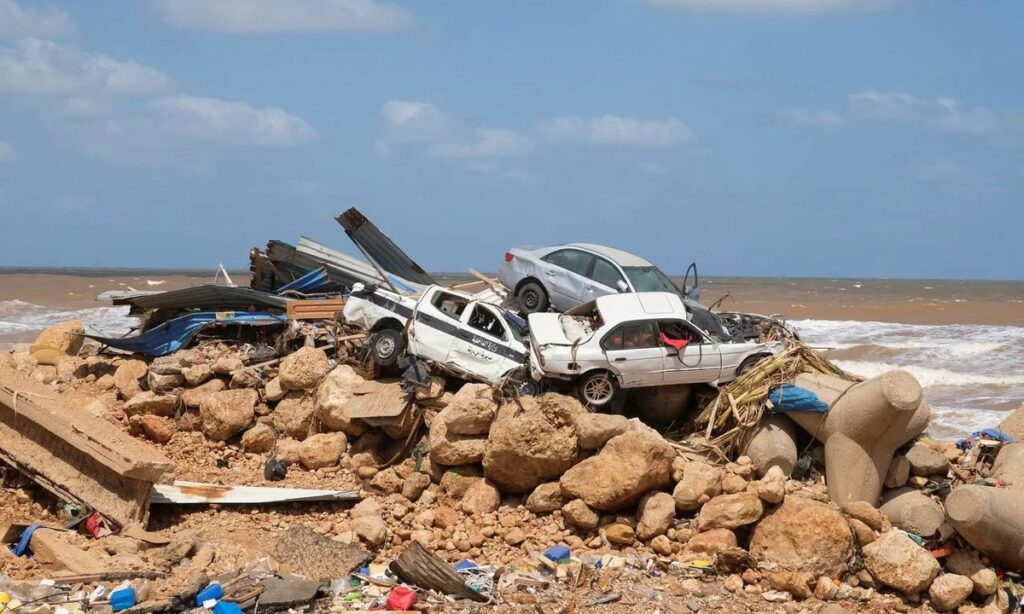Food & Climate
In African countries, 1,436 natural disaster events were recorded between 2000 and 2023, 66% were associated with floods, 15.4% with storms, and 11.7% with droughts, according to the African Risk Capacity (ARC) new paper, which “Food & Climate” platform received.
(ARC) has published a white paper examining the state of natural disasters in Africa. The paper titled “The State of Natural Disasters in Africa”.
The paper sheds light on a growing concern: the increased frequency of weather-related natural disasters and their devastating economic impact on the continent. Over the last decade, the frequency of disasters has steadily increased, rising from 32 incidents in 2014 to 56 occurrences in 2023, mainly due to floods, in 29 African countries where data is available.
It is estimated that African governments spent $2.2 billion managing weather-related natural disasters in 2023, with approximately 25% attributable to Libya, which accounts for over 0.5% of Libya’s GDP.
Floods and drought
Climate change underlies the more frequent and severe weather events like droughts and floods, causing significant loss of life, destruction of livelihoods, and displacement of communities.
Analysing the economic burden of weather disasters on African nations, the paper provides insights into the cost of disaster risk management, explores the current trajectory of weather events, and proposes response mechanisms for effective disaster management.
“Understanding the current state of disaster risk management and the challenges and opportunities it presents is crucial in informing effective response strategies. The publication of the ARC white paper marks an important step forward in our ambition to contribute to knowledge creation,” said Ibrahima Cheikh Diong, UN Assistant Secretary-General and ARC Group Director General.
The paper shows the impact of heavy rainfall has been intensified by deforestation and inadequate land management practices. Even though floods are dominant, the data showed that droughts affected more people.
For instance, in 2014, about 5 recorded drought events affected more than 25 million people, whereas 20 flood events affected less than 1 million people. This observed pattern is consistent in the timeframe covered by the data.
Tracking the occurrence of weather-related natural disasters since the year 2000, Africa has the third highest number of weather-related natural disasters among five continental regions: Asia, the Americas, Europe, and Oceania. The worst-affected countries in Africa, were South Africa, Mozambique and Madagascar in southern Africa; Nigeria in the west; and a band stretching north-eastwards from Angola to Ethiopia and Somalia in the Horn of Africa.
Economic losses
Munich Re estimates that the continent’s total direct economic loss from such events over the year was $8 billion. Storm Daniel in Libya and Tropical Cyclone Freddy in Mozambique were two of the most severe events that occurred in Africa in 2023, estimated to have inflicted economic losses of $1.65 billion and $1.53 billion, respectively.
Moreover, the white paper shows that changing weather patterns promote the spread of waterborne diseases like cholera and insect-borne diseases like malaria, threatening the progress that has been made on reducing the incidence of epidemics since 2000.

The paper highlights the importance of early warning systems and their ability to save lives, showcasing of Africa RiskView, ARC’s early warning system designed to anticipate and manage climate risks.
“It’s simply unacceptable that only 40% of Africa is currently covered by EWS and even those are compromised by quality issues,” noted Diong, highlighting that just 24 hours’ notice of an impending hazardous event can cut the ensuing damage by up to 30%.
According to the United Nations Office for Disaster Risk Reduction, countries with substantial to comprehensive early warning systems coverage have one-eighth the disaster mortality of those with limited or no coverage, highlighting the significant benefits of investing in EWS in terms of saving lives.
What is (ARC)?
African Risk Capacity (ARC) Group consists of ARC Agency and ARC Insurance Company Limited (ARC Ltd). ARC Agency was established in 2012 as a Specialised Agency of the African Union to help the member states to strengthen their capacities to better plan, prepare and respond to climate-related disasters and disease outbreaks. ARC Ltd, the financial affiliate of the Group, is a mutual insurance facility responsible for providing risk transfer services to the member states through risk pooling and access to reinsurance markets.

